To Save Our Safety Net, Continue the Regional Coronavirus Approach
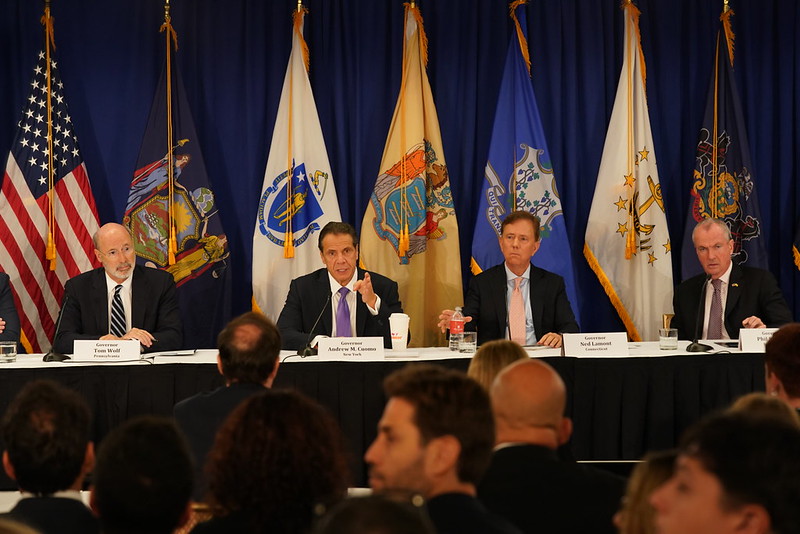
Gov. Cuomo with neighboring governors (photo: Governor's Office)
Tri-state governors have coordinated to close bars. Now they must coordinate to close tax loopholes.
Governor Cuomo has gotten a lot right in addressing the COVID-19 health crisis in the past few weeks. But at the state budget deadline, he has been far too willing to shred the social safety net that millions of New Yorkers rely on, and so many more will need as the economic crisis worsens.
One thing he got right could point the way to repair some of that damage.
Cuomo saw right away the need to get New York working closely with New Jersey and Connecticut. The governor quickly brought the tri-state region together to shut down bars and recreational businesses, and to collaborate on a regional approach to confront the coronavirus crisis.
That’s no small feat. Regional coordination has long been the elusive dream of good government gurus, seeking a saner approach to transportation and economic development. President Trump appears so threatened by this new tri-state alliance that he threatened to quarantine us off from the rest of the country.
Now that this tri-state partnership exists, we must use it for more. A regional approach can help us replace lost revenue and rise to the recovery challenges we face.
As New York State looked ahead to its new fiscal year, a $6 billion budget deficit was blown wide open by the pandemic, with tax revenue projected to drop by as much as $15 billion. Given the halt of so much economic activity and mass layoffs, Connecticut and New Jersey face similar problems. The federal relief package offers scant help. We must keep fighting for more, but it’s not likely to be anywhere near enough.
To address the budget gap, Governor Cuomo has pushed reductions to health care and public education funding (including steep cuts to already diminished CUNY and SUNY schools), and in aid to cities and counties. In the midst of the crisis, his Medicaid Redesign Team proposed a $2.5 billion cut to the projected state Medicaid budget, including $400 million that would have gone to hospitals just as they battle coronavirus.
Some cuts are necessary, but these cuts to our core safety net programs will be devastating to the very people hardest hit by the COVID-19 crisis. The coronavirus pandemic has turned pre-existing gaps into gulfs. Those who were already on the margins, served by underfunded hospitals, or living paycheck to paycheck, are hit hardest by the public health and economic catastrophe. Undercutting their health care and education is not the answer.
Revenues are going to take a big hit, though, as income and sales taxes plummet. So we need new ways to raise funds from those who have plenty, rather than cutting services for those who did not have enough even before this crisis.
As he has been in the past, Governor Cuomo has been reticent to increase taxes on the wealthiest New Yorkers, or even to close tax loopholes.
But his own regional response offers a new, smart way to do so. In the past, one concern he has voiced about such policies has been that businesses or wealthy individuals will flee New York State to avoid any new tax policy, thus depriving us of even more revenue. After all, it is not that hard to commute to work on Wall Street from Greenwich rather than from Scarsdale. Or to move your business address to Jersey City.
One change that advocates have long sought is to close the “carried interest” loophole. Because of this loophole, the income of private equity and hedge fund managers is taxed at half the rate of other taxpayers (their income is taxed at the “capital gains” rate, lower than the income tax rate, even though this is not investment money that the managers have put at any risk).
Two years ago, Cuomo proposed to close this loophole, calling it a “fairness fix” that could bring in over $1 billion to state coffers. But there was one hitch: it would only go into effect if neighboring states would adopt it as well. Sadly, they did not.
The regional compact that the governor has established to confront the COVID-19 crisis is a great opportunity to revive this effort. Just as our states have coordinated to close bars and restaurants, we can coordinate to close this loophole.
The governors should take a similar approach to coordinate on other proposals to tax the region’s very wealthiest, such as a tax on wealth over $1 billion, annual income over $5 million, or an increase in corporate tax rates. Yes, Wall Street has taken a hit. But the top 1% in our region are not facing food insecurity, eviction, and homelessness.
Given the likely need to reopen this budget as the contours of economic and fiscal challenges become clearer, and the pain of the cuts is felt, it is not too late to consider these tax policy changes. In fact, it is right on time.
Raising revenue to fill budget gaps and provide essential services is not the only place where new models of regional partnership are needed. Governor Cuomo railed at the federal relief effort passed last week, harping on the relatively smaller pot of direct aid for New York state and local governments. But that’s not the only place the federal response fell short.
Our region has flourished over the past decades as a result of the work and creativity of immigrants. But many of those very families (undocumented people, mixed-status families, and even many immigrants with legal status) will be denied federal relief. They will not be eligible for the $1,200 emergency checks heading out to the majority of Americans, or for the expanded disaster unemployment insurance. Without help, they will soon be facing very real crises, unable to pay for food or rent.
Our region’s economy is built on the labor and the spending of these workers and their families, who work in restaurants, clean buildings, deliver food, take care of the elderly and the young, and much much more. We cannot afford to leave them behind.
We need a regional approach both to make up the budget shortfall and to put money where it is urgently needed right now: in our hospitals, and in the pockets of the most vulnerable families.
We will all feel the squeeze of this crisis. But those who will suffer the most are those whose health insurance, education, and social services have been put on the chopping block. Using a regional approach to raise revenues from those who have more than enough is both the smart and compassionate path forward.
***
Brad Lander is a New York City Council Member from Brooklyn, and the Council’s Deputy Leader for Policy. He is a candidate for New York City Comptroller in 2021. On Twitter @bradlander.
***
Have an op-ed idea or submission for Gotham Gazette? Email This email address is being protected from spambots. You need JavaScript enabled to view it.
Amid Coronavirus Crisis and Beyond, Equal Justice for All, Including U.S. Senators
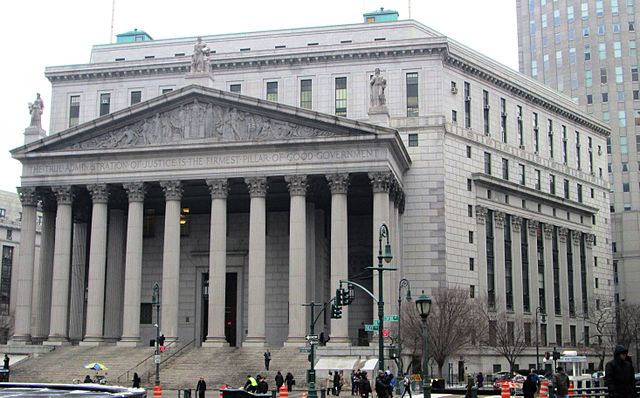
Equal justice for all, whether a top elected official or not, the author writes (photo: Wikimedia Commons)
Alongside the daily coronavirus news come allegations about shocking abuses of power. Several United States senators, most notably Senators Burr and Loeffler, allegedly used non-public information — confidential congressional briefings about COVID-19 — to sell stocks whose prices they believed would drop due to the pandemic. Even worse, while taking steps to profit from the coming pandemic, both assured constituents that there would be no public health or economic crisis. Instead of pushing the president to act sooner, they lulled segments of the public into complacency. This alleged conduct is morally abhorrent and possibly illegal.
But if history is any guide, any prosecution of these senators is likely to proceed far differently from the typical prosecutions of everyday Americans. The coronavirus has laid bare so many stark inequities in our society, like access to health care, economic ability to do social distancing, and even access to coronavirus testing. This crisis is also further revealing terrible truths about the inequities of our criminal justice system — inequities long in need of sweeping reform for the sake of justice, now also more urgently than ever for the sake of public health.
Consider the disparity between what these senators would face in the criminal justice system with what is faced by ordinary people, so many of whom are currently at risk for coronavirus infection because of their unnecessary incarceration.
Based upon my time as a federal prosecutor focused on public corruption, here is likely what will happen next to the senators, if they’re investigated. Federal prosecutors will analyze the stock trades, interview people who attended closed-door briefings with the senators, and subpoena the senators’ financial records. Defense lawyers will have the chance to meet with prosecutors before any charges are brought; they’ll be shown incriminating evidence and given the chance to argue that no charges should be brought. If charges are brought, Senators Burr and Loefller will be permitted to turn themselves in rather than be arrested, the judge will set an affordable bail amount, and they will subsequently enjoy ample process, a speedy trial, and, if found guilty, fair treatment post-conviction.
This process will bear little resemblance to what happens every day to ordinary defendants: quick arrests often followed by little to no investigation, exorbitant bail beyond the defendant’s reach, slow or last-minute disclosure of evidence the prosecutor will use at trial, elusive trial dates adjourned for years, and, if found guilty, abhorrent prison conditions and re-sentencings for technical parole violations.
This situation was dire before the coronavirus. Our country’s incarceration rates are historically high and well out of line with other countries. Our jail and prison population has ballooned by 500% over the last 40 years, and we are home to 5% of the world, but 25% of incarcerated persons. Research demonstrates that these high incarceration rates do not make us safer.
Now, it’s dire from both a criminal justice and public health perspective. People already in custody and those arrested during the pandemic will be at a heightened risk for contracting the coronavirus. Arresting people and taking them to the courthouse involve multiple interactions during which the coronavirus may spread. People in jails are in overcrowded spaces, unable to practice social distancing, and with little or no access to soap.
Advocates, elected officials, and some law enforcement leaders have pointed to immediate steps to shrink the jail and prison populations: halt arrests for low-level offenses; end cash bail (or, in New York’s case, maintain recent bail reforms); stop imprisoning people for technical parole violations; and release incarcerated people at high coronavirus risk because of age or health conditions, whether through clemency or other methods. These measures are critical from a justice perspective: in the current situation, failing to take these measures will be tantamount, for many, to a death sentence. But it’s also a matter of public health and reducing the spread of the virus.
The coronavirus has led to a swift unmasking of many unjust fault lines in our law and society. Just as coronavirus tests should be available to everyone, not just the connected or famous, a criminal justice system that’s compassionate, effective, and fair should be available to everyone, not just those who are wealthy, or who happen to be senators.
***
Alvin Bragg served as Chief Deputy New York State Attorney General and a federal prosecutor in Manhattan. He is a Visiting Professor, Co-Director of the Racial Justice Project at New York Law School, and candidate for Manhattan District Attorney. On Twitter @AlvinBraggNYC.
***
Have an op-ed idea or submission for Gotham Gazette? Email This email address is being protected from spambots. You need JavaScript enabled to view it.
It’s More Important Than Ever for the City to Take Care of Those Who Care for the Most Vulnerable New Yorkers
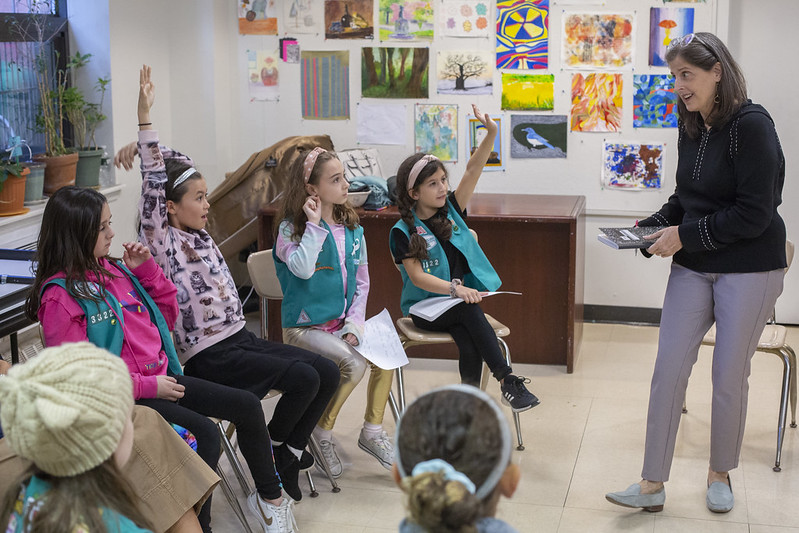
Council Member Helen Rosenthal, the author (photo: John McCarten/City Council)
To address the coronavirus crisis and save lives, New York City government and New Yorkers are mobilizing in ways never seen before. The City swiftly sent an unprecedented message to our human services sector -- the 250,000-plus employees who provide housing access, child and elder care, shelters, emergency food relief, mental health counseling, and disaster response. These workers -- traditionally undervalued, underpaid, and unappreciated -- were told that they are on the front-line of the COVID-19 crisis, and they will be appropriately supported for their dedication.
The City made it clear that all programs will be paid in-full, even if services have to be adjusted. Human services providers will be reimbursed for additional COVID-19 costs, such as safety supplies and staff shortage or personnel changes. And the City is streamlining its administrative practices to further assist providers. These are all profoundly helpful measures.
To its great credit, the City took these measures within the first days of the crisis, during a period of great uncertainty. At the same time, both the de Blasio administration and the city Comptroller’s office have worked to expedite payments to human services providers as soon as invoices come in.
But there is more to be done. Here are the next steps.
Front-line human services workers should be paid overtime for their hours spent working directly with the public. Why? Because they are risking their lives for those most in need: case workers and janitors who work at shelters; street homeless outreach workers; and staff at senior centers. As the City negotiates “incentive pay” for its own front-line staff, the non-profit agencies that provide city services should be given the same consideration.
For those who need it, front-line human service workers should be given child care vouchers to pay family members or trusted neighbors to watch their children.
Lastly, to put everyone’s mind at ease, human services providers should be given reassurance now that their contracts will be renewed in the next fiscal year, which starts this July 1. Now is the time to allow these mission-driven nonprofits to focus on the needs at hand. Just a few weeks into this crisis, we are already seeing a surge in unemployed New Yorkers who will need food pantry and other social safety net assistance and a lack of sufficient support for already vulnerable residents, such as seniors and people with disabilities.
The COVID-19 pandemic has exposed what many working class people have always known: the heroes in our society are very often the ones with traditionally undervalued roles. Now more than ever, we must see the value in the workers who care for our elders and young children; the staff who support our homeless shelters; the employees who keep our food pantries open; the counselors who staff our emergency hotlines; and many, many others.
We can’t get through this crisis without them. As quickly as possible, let’s move forward and fully support the human services sector’s critical work by providing childcare, financial security, and ongoing resources in the city budget.
***
City Council Member Helen Rosenthal is a Democrat representing parts of Manhattan. On Twitter @HelenRosenthal.
***
Have an op-ed idea or submission for Gotham Gazette? Email This email address is being protected from spambots. You need JavaScript enabled to view it.
How to Craft the Bare Bones State Budget New York Needs
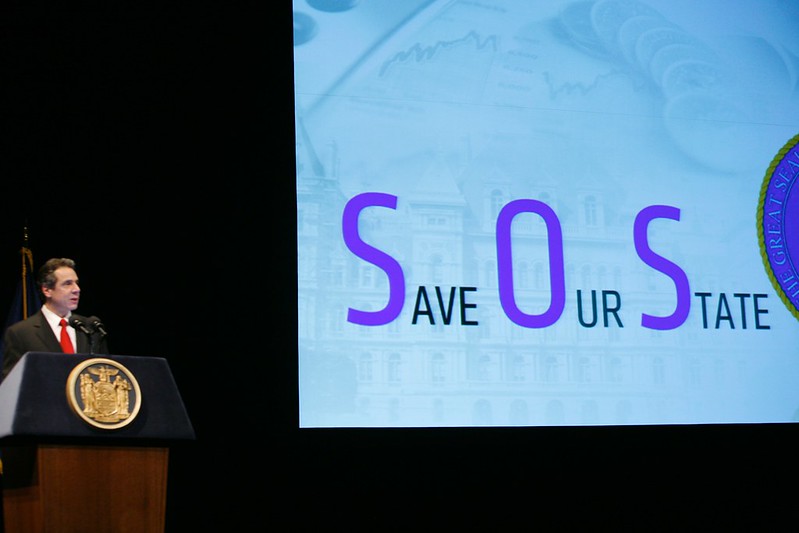
Gov. Cuomo and the Legislature must budget thoughtfully (photo: Governor's Office, 2011)
This week the New York State Legislature is supposed to adopt a budget for the 2020-21 fiscal year that begins Wednesday, April 1. Legislators are facing an unparalleled challenge: the coronavirus has caused the bottom to very suddenly fall out of the state’s economy and therefore, its revenue. Without restaurants and stores open, there can be very little sales tax collected; hundreds of thousands of employees laid off means no personal income tax withheld from paychecks; slowed real estate sales means reduced transfer and other transaction-related taxes; and so on and so on.
Estimates on the loss of state revenue for the coming year range from Comptroller Tom DiNapoli’s $7 billion to State Budget Director Robert Mujica’s $15 billion. No one really knows and it depends on how quickly things can start getting back to normal, but there is no question the revenue fall off is going to be dramatic.
Governor Andrew Cuomo, understandably desperate about how to deal with the fiscal crisis while fighting the virus, has expressed frustration and disappointment that the U.S. Congress is not filling this huge budget hole. Congress has come through with aid that will help offset some of the costs of Medicaid, help with other virus-related medical costs, provide some support to state and local governments, and most importantly, give direct assistance to families and businesses. It may well be that there will be additional congressional action to stimulate the economy and, possibly, provide more state and local budget assistance.
But New York cannot and should not wait. Our budget problems are structural, and they have been brewing since long before the virus hit the U.S.
Now is the time for the governor and legislative leaders to show the moral courage and fortitude to do what they know is needed, even if it is not what the interest groups that usually prevail in Albany want:
-Stop adding billions in school aid, especially for wealthy districts that already spend more than $30,000 a year per student. There is absolutely no justification for increasing school aid; instead it should be reallocated to those districts that need it. If we don’t exercise control now, we will soon be faced with having to cut aid as Governor Patterson had to do in the Great Recession of 2008.
-Adopt the reforms recommended by the Medicaid Redesign Task Force. Yes, some of the reforms, such as imposing controls on fiscal gimmicks used by some families to avoid responsibility for the long-term care of their loved ones, may not go into effect until after the national state of emergency is lifted. But others can be implemented right away and far more is needed to cut the growth in long-term and personal care, which have been growing exponentially. All the reforms should be adopted now so they can go into effect when possible and far more Medicaid savings needs to be found ASAP.
-Cut back on economic development programs that are not generating a return on investment and/or are not essential. For example, we just cannot afford to give $400+ million a year in tax credits to the TV and film industry.
-Freeze public employee salaries, including not just the planned imminent across the board 2% increase but also automatic step increases. Yes, we value our hard-working and dedicated public-sector workers but now is not the time to give raises to already reasonably compensated people while so many New Yorkers are struggling to pay their rent and put food on the table. Public employee unions should support this policy until economic conditions improve.
-While many state agencies are already operating at a bare bones level, it is time to impose an across the board percentage cut in spending except for those activities that are directly related to fighting the coronavirus pandemic. Yes, this will be characterized as ‘draconian’ but there is no choice if the state is to husband its scarce resources to provide essential services.
-Resist calls to increase taxes on anyone. Now is surely not the time to raise taxes, even on wealthy people. We are already the highest taxed state, federal deductibility is severely limited, Wall Street earnings are plummeting, and more than ever, we need that small group of people who pay 40% of our income taxes to stay here and not move to less tax- (and coronavirus-) burdened states.
I watched Governor Cuomo’s daily press briefing on Sunday, in which he said he doesn’t want to wait for a federal bailout; he intends to move forward with a state budget on schedule. He is right. But it is also important to acknowledge that it is not the federal government’s fault the state is facing a major budget shortfall, and that much of our problem is that we have avoided dealing with rising costs (and low reserves) because no one wants to take the political heat. We need our representatives to step up and adopt an austerity budget on April 1. If circumstances change, it can be modified during the year and, we must all hope, pray, and do all we can to get out of this crisis so that the 2021-22 budget process is less fraught.
***
Carol Kellermann was president of Citizens Budget Commission from 2008 through 2018.
***
Have an op-ed idea or submission for Gotham Gazette? Email This email address is being protected from spambots. You need JavaScript enabled to view it.
Expanding Construction Prevailing Wage Mandates Would Worsen Our Economic Crisis
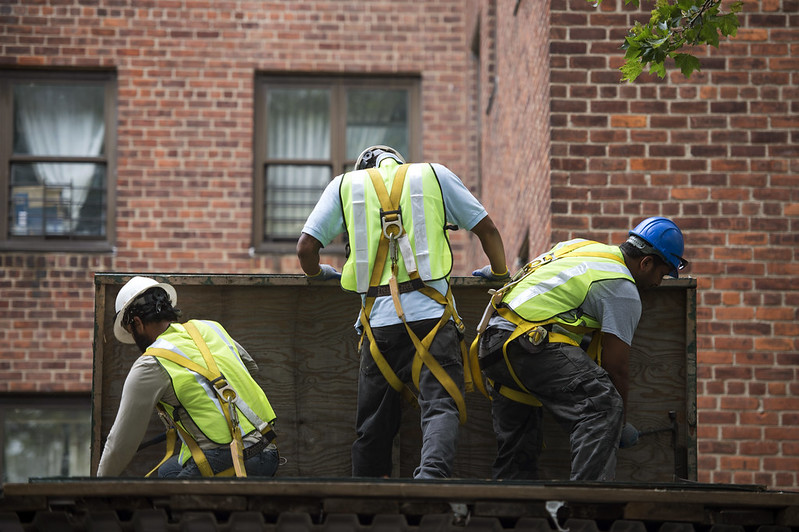
Construction and the coronavirus recession provoke key questions (photo: Demetrius Freeman/Mayor's Office)
As the coronavirus crisis continues to hit New York harder than any other state in the nation, Governor Cuomo, Senate Majority Leader Stewart-Cousins, and Assembly Speaker Heastie have undoubtedly answered the call and stepped up in a big way to protect New Yorkers and address statewide needs.
But as they consider ongoing negotiations over the state budget – amid a partial shutdown of New York’s massive construction industry – state lawmakers must ask themselves whether it makes any sense right now to ram through a controversial expansion of construction prevailing wage mandates.
That answer is an obvious and resounding no.
The proposal to expand prevailing wage mandates to many private construction projects was always a bad one – but it is even worse as we enter an economic downturn that may very well become a recession. That’s because it would eliminate good construction jobs and contracting opportunities when they will be most needed to help New York rebound from the COVID-19 outbreak and its ramifications.
We already know that this proposal would raise construction costs by around 30 percent – which translates to billions in additional costs – and make it impossible to advance major projects in New York City, Long Island, and throughout upstate communities. We already know it would inevitably leave tens of thousands of workers jobless and prevent small local contractors – especially MWBEs – from getting the business they need to keep the lights on. That’s why this proposal has been sensibly rejected year after year.
Now, just imagine those negative impacts hitting the construction industry a few months from now, as New York emerges from this public health crisis and attempts to jumpstart our economy by getting people back to work.
We already know we’re in uncharted territory. Amid a record-setting 3.3 million unemployment claims nationwide, New York State Comptroller DiNapoli has already sounded the alarm on an ensuing “deep recession,” with the comptroller and other state budget officials warning that the COVID-19 pandemic is projected to cost New York state government $9 billion to $15 billion in lost tax revenue, indicative of a massive loss of economic activity. And the $2 trillion stimulus bill the federal government passed in response to COVID-19 only provides $3.1 billion for New York – not nearly enough to offset the subsequent costs of the economic calamity.
Simply put, any special interests that support a prevailing wage expansion right now are essentially arguing that New York should address crushing economic challenges and rising unemployment by taking away more jobs and making it harder for businesses to operate. That would just be irresponsible.
And remember that when we say this isn’t just a downstate issue, we mean it. Our recent letter to state officials was signed by more than 20 groups statewide, including regional organizations from Buffalo, Albany, Binghamton, Plattsburgh, Brooklyn, and Long Island.
So, as state lawmakers finalize a budget that will hopefully help us rebuild New York’s economy, we hope they stay focused on just that – rebuilding. That won’t happen if they impose controversial new mandates that do more harm than good to workers and businesses alike.
***
Kyle Strober is executive director of the Association for a Better Long Island and Mitch Pally is CEO of the Long Island Builders Institute. On Twitter @KyleStrober & @MitchPallyLIBI.
***
Have an op-ed idea or submission for Gotham Gazette? Email This email address is being protected from spambots. You need JavaScript enabled to view it.
Shut Down the Subway – and Fix It
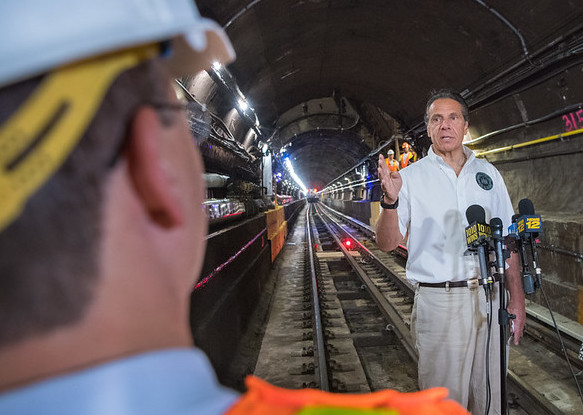
Gov. Cuomo should close the subways, the author writes (photo: Governor's Office)
New York City is the epicenter of the coronavirus crisis in the United States. State and city authorities are pleading with residents to stay home, shelter in place, and maintain distance from fellow New Yorkers to slow the wave of cases crashing into the city’s healthcare facilities.
Yet, public transportation was running on the standard weekday schedule as of Monday morning. With subway ridership down ridership down 87%, the response on Tuesday was to cut trains by a quarter.
Such quarter-measures will not serve the city well. A full closure of the subway is needed, along with steps to dedicate buses and other transportation services to the essential workers who are saving lives and keeping the city running. As drastic and disruptive as shutting down the subway sounds, doing so can slow the spread of the virus. Apart from the exigency of the public health crisis, the unprecedented fall in ridership also offers an opportunity to undertake repairs and fixes that would be disruptive in normal times -- and help set the stage for the system’s recovery.
There is an irreconcilable tension between running public transport essentially as normal while authorities order folks to stay at home. Public transportation accounts for most trips within the city, and the virus travels alongside passengers in the confined spaces of trains and buses. Public transit was suspended on the first day of the lockdown in Wuhan, China in order to slow the circulation of people and the virus they may carry, and Chinese public health officials have urged cities to suspend service in other affected countries. MTA workers -- not to mention CEO Patrick Foye -- are falling ill themselves and the decision to run fewer trains has increased crowding, and thus transmission risks.
The MTA needs to immediately cease providing fully “public” public transportation. Addressing this crisis requires taking seriously the real economic, social, and health costs of continuing to provide service, and beginning to think about how the system can recover after the crisis.
The MTA should shut down all subway lines and use the time for several weeks’ worth of dedicated repairs, accomplishing fixes that would in normal times have to be stretched over months or years. Typically, major disruptions to train operations for necessary repairs are impossible or at least extremely difficult due to rider pushback, even when closures allow for faster and cheaper progress.
The subway is the circulatory system of New York City. In drastic open-heart surgeries, the heart is stopped and damage repaired to help the patient come back healthier. Taking advantage of a time when circulation needs to halt to ensure the health of the subway when it restarts is prudent and will allow New York to come back from this crisis stronger than before.
This would be an effective use of money set aside for public transportation in the new federal stimulus bill, and closure will also help strengthen existing shelter-in-place orders to slow the spread of the virus throughout the city. With ridership already at historically low levels, coupled with an imperative to minimize travel, the typical disruptions from repairs are minimized. Making progress on the extensive backlog of much-needed repairs to dilapidated stations, outdated power systems, and other priorities while advancing progress on essential signals upgrades will help the subway emerge more reliable and faster for New Yorkers after the crisis, which will help the system more quickly recover ridership.
There are, of course, major logistical challenges that must be overcome to make such a plan workable. For one, healthcare providers and other critical workers need to get to their jobs. MTA buses should be dedicated to the transport of essential workers only, maintaining existing routes on streets cleared of competing traffic. For essential workers unable to commute by bus, the city should draw on its taxi fleet to provide alternative transportation or partner with app-based services.
Care will also need to be taken to ensure the health of workers undertaking repairs. Workers will need to be screened (at least for their temperatures, if coronavirus testing delays persist), worksites will need to be consistently monitored for transmission risks, and workers must be provided guaranteed care in the case that transmission does occur on the job. Practices and procedures will have to be adapted to match the needs of these unusual times.
Slowing the spread of the coronavirus in New York requires dramatic actions, and halting public transportation to reinforce existing orders is just one needed step. Stopping the trains now and using the time to make necessary repairs can also lay the foundations for New York’s recovery by creating the opportunity for the city, and its public transportation, to bounce back better than before.
***
Patrick Farrell is a Master in Public Affairs student concentrating in economics and public policy at Princeton University with prior experience as a researcher focused on urban economics at New York University. He is a co-author of the article Social Connectedness in Urban Areas, which explores the distribution of social networks in New York City and the role of public transit in shaping them.
***
Have an op-ed idea or submission for Gotham Gazette? Email This email address is being protected from spambots. You need JavaScript enabled to view it.
State Budget Negotiations are Focused on the Wrong Priorities; We Need an Emergency Coronavirus Package
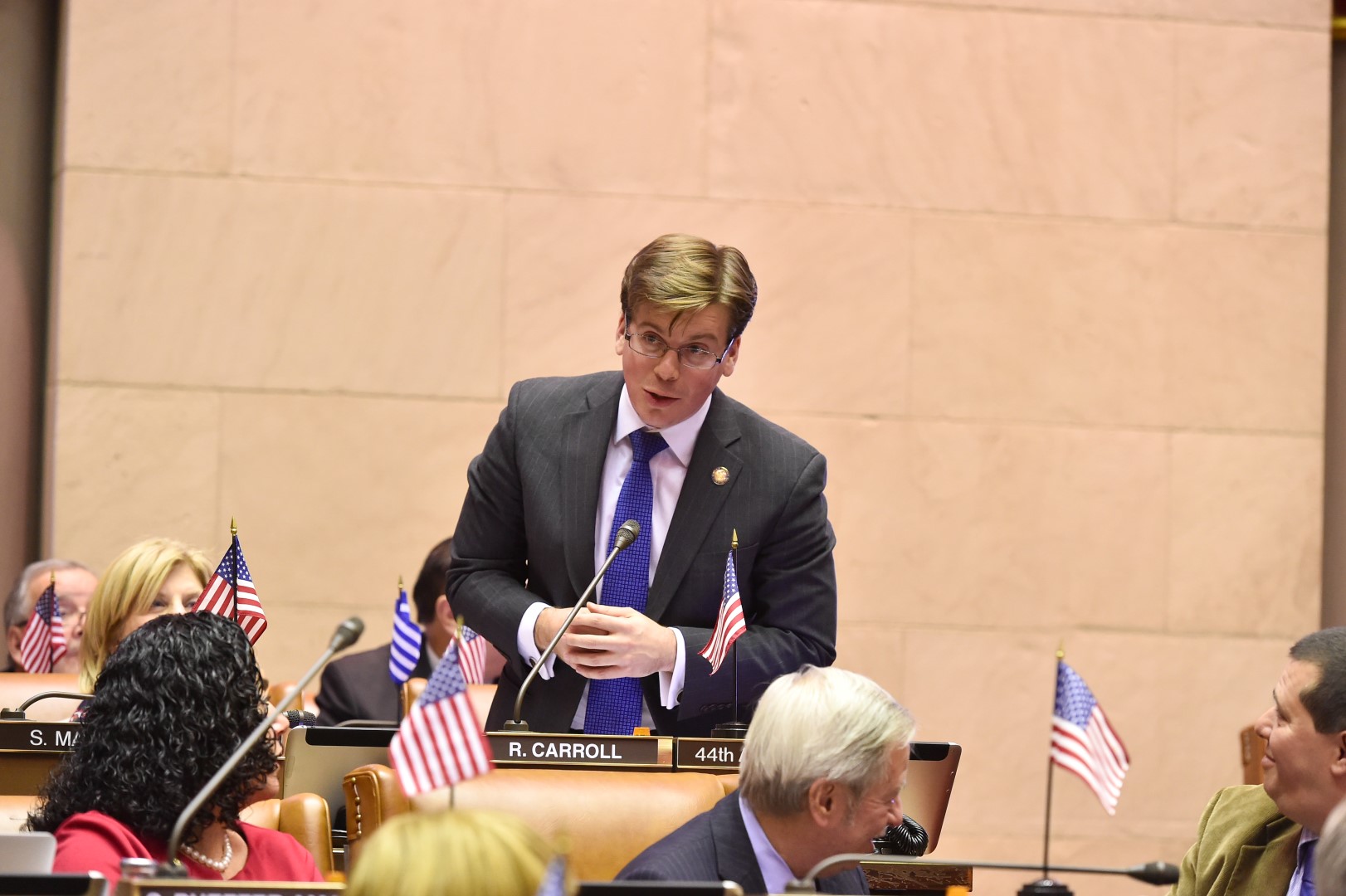
Assemblymember Carroll, the author (photo: New York State Assembly)
In a few days the New York State Legislature will pass a new state budget. In a normal year, this is the most consequential task the Legislature does. In a crisis year, it may be the last thing we do.
What we do now could help New Yorkers weather the storm. Unfortunately the discussions we are having, which are few, are emphasizing the wrong issues.
To understand New York’s politics, one must understand that New York’s budget is not just dollars and cents, but also a way to enact legislation. In normal years, this is a poor way to run government because it stifles debate and lacks transparency. In a year where the Legislature cannot meet in large groups and advocates and stakeholders are quarantined, it is downright anti-democratic.
Currently, via text and conference calls, the Legislature is discussing Medicaid cuts and big policy decisions like legalization of marijuana and gestational surrogacy, and rolling back bail reform. This is frustrating and frightening. Governor Cuomo has done a phenomenal job in responding to the coronavirus (COVID-19) outbreak, but he is acting like this year’s budget process is no different than last year’s.
There is a common-sense solution to this problem. Push off major policy debates and legislation that are not connected to COVID-19.
This includes policy issues I support, like the legalization of adult use marijuana and surrogacy, and issues I don’t support, like rolling back bail reform or creating new criminal penalties. Rolling back bail reform is especially distressing since we know jails and prisons are particularly vulnerable to epidemics. No one deserves to die from coronavirus, but it would be especially tragic if individuals held in detention died awaiting trial on minor charges. Sticking to criminal justice, Governor Cuomo should be bold and release prisoners who have served at least 50% of their sentence and are vulnerable to COVID-19 due to age or underlying health conditions. Our prisons are bad enough, we should not allow them to become death traps.
Thankfully, the governor has moved the presidential primary from April 28 to June 23, but now the Legislature must act to protect every New Yorker and ensure participation in our elections by mailing every New Yorker a ballot for the primary and general elections.
Second, we should suspend rent payments for the next 90 days for residential and commercial tenants who lost their job or business due to coronavirus. Landlords should get a similar reprieve from mortgage payments in an amount consistent with their lost rent. The governor already barred foreclosures and evictions for 90 days, this is the logical next step.
Third, we should require insurance companies to honor business interruption insurance. It is unconscionable that insurance companies that were bailed out in 2008 won’t pay out business interruption policies because they say “viruses” were either explicitly carved out of policies or because adjusters claim a “virus” is not a “physical” interruption.
Last and most importantly, we cannot cut Medicaid. Yes you heard that right – the current state budget plan, as outlined by the governor, would cut Medicaid funding to some of our neediest communities and hospitals. What we need to do is increase funding to our hospitals and other critical pieces of infrastructure that are currently taxed or are facing severe deficits, like the Metropolitan Transportation Authority (MTA).
The only way to do that is to raise taxes. Raise them on second homes over $5 million, raise them on individual earners over $1 million, raise them on luxury goods, or charge fees on non-essential online deliveries. No matter what we do, we need the revenue because the federal stimulus has not addressed lost state revenue.
In the last 20 years, New York lost thousands of hospital beds because of a medical system that is built on profit. Land that was valuable was sold to real estate speculators and hospital beds were lost. We had our priorities out of whack. Let’s not do it again. Governor Cuomo, if you are able to do all that and get the Legislature to go along with it, #CuomoForPresident will no longer just be trending on Twitter and might just become a reality.
***
Assemblymember Robert Carroll is a Democrat who represents Park Slope, Windsor Terrace, Kensington, Ditmas Park, and other neighborhoods. On Twitter @Bobby4Brooklyn.
***
Have an op-ed idea or submission for Gotham Gazette? Email This email address is being protected from spambots. You need JavaScript enabled to view it.
Coronavirus Crisis Presents Opportunity for the City to Finally Step Up for Struggling Taxi Drivers
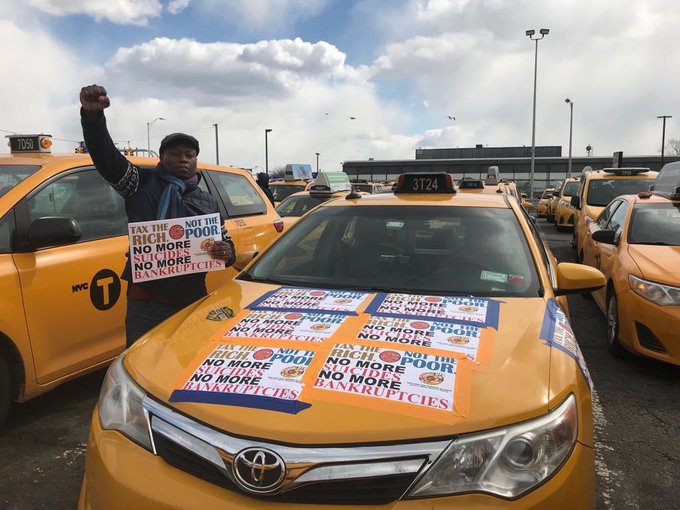
Taxi drivers push for help (photo: @NYTWA)
In the past month, the coronavirus pandemic has brought our world to a standstill, causing emotional and financial hardships for Americans around the country. As schools, restaurants, and retailers across New York shutter indefinitely, it is clear that no industry, or worker, will go unaffected.
Among those hit hardest, however, will be New York’s over 21,000 yellow and green taxi drivers, who have already been struggling to survive in the wake of the financial ruin of the medallion debt crisis.
Just weeks into unprecedented travel restrictions, event cancellations, and shelter-in-place policies, taxi workers are already feeling the crushing weight of lost business worse than most. Recent reports describe drivers searching for hours without being able to pick up a single fare, to say nothing of the heightened risk they face of catching the virus if they are even lucky enough to get a few fares during a shift.
For New York’s taxi drivers, the coronavirus pandemic has exponentially exacerbated the financial problems they faced before the outbreak, with no end in sight. As the coronavirus outbreak worsens, however, it doesn’t need to be so devastating for taxi drivers. In fact, it could be what finally brings about needed, lasting change to the industry.
As has come to light in recent years, the value of taxi medallions was recklessly and artificially raised by powerful industry insiders and city government for nearly a decade. The resulting bubble was frighteningly identical to the housing market crash that set off the Great Recession in 2008, trapping thousands of low- to middle-income owner-drivers, many of them immigrants, into sub-prime loans. Only instead of losing their homes, taxi workers lost their businesses and livelihoods.
Both city government and the lending industry share blame for where the taxi industry is today. While the city’s Taxi and Limousine Commission made over $800 million off medallion sales between 2004 and 2014 alone, it is the predatory lenders who nefariously created unfavorable contracts with paralyzing interest rates and conditions. The predictable result was countless taxi owner-drivers saddled with hundreds of thousands of dollars in debt on an investment they were falsely promised could never fail.
Now it is time to act.
While New York rolls out programs to support small business owners and gig workers alike during this unprecedented public health and economic crisis, the city cannot and must not again fail the taxi drivers it failed to protect once before. Mayor de Blasio has already announced his administration will offer zero interest loans to small businesses that have experienced a loss of revenue because of the coronavirus fallout. A similar program should be created for taxi drivers, whose medallion-licensed taxis are themselves small businesses. It’s encouraging that a new temporary program will give TLC licensed drivers jobs delivering food to senior citizens who can't leave home during the shelter-in-place order.
But these programs are simply stopgaps that will make conditions for taxi workers more tolerable during this crisis. What taxi workers truly need is a path away from the debt that weighs them down and towards a more sustainable, financially sound future.
Just weeks before the coronavirus outbreak began, a City Council-created commission produced a report outlining how the City could steer the city’s taxi owner-drivers out of their debt struggles and into a successful future. Core to the proposal was leveraging public-private partnerships in which mission-driven firms such as ours work with taxi drivers to provide the necessary structural and technological changes they need to be competitive with the likes of Uber and Lyft.
Though it should have been done years ago, the city must now heed the call to action by Bhairavi Desai and the Taxi Workers Alliance to cancel all medallion owner debt over $150,000, while also guaranteeing them paid sick leave.
While coronavirus has exposed just how vulnerable New York’s taxi drivers are, the city is now facing the perfect moment to take bold action that could help so many hard-working drivers, including many immigrants, and save the yellow taxi industry that is deeply embedded in the fabric of our city. Taking action on the commission’s plan immediately is the only way to truly answer the calls of the Taxi Workers Alliance and their members, and the timing could not be more prudent.
New York left these drivers behind once before. It’s well past time for our city to not only give them a fighting chance to survive this pandemic, but an opportunity to rebuild their business so they can thrive for decades to come.
***
Zahid Biviji and Mihir Dange are the Co-Founders of Wapanda, a mission-driven transportation infrastructure technology platform. On Twitter @Wapandaco.
***
Have an op-ed idea or submission for Gotham Gazette? Email This email address is being protected from spambots. You need JavaScript enabled to view it.
Prevailing Wage is Economic Stimulus - New York Should Expand It Now
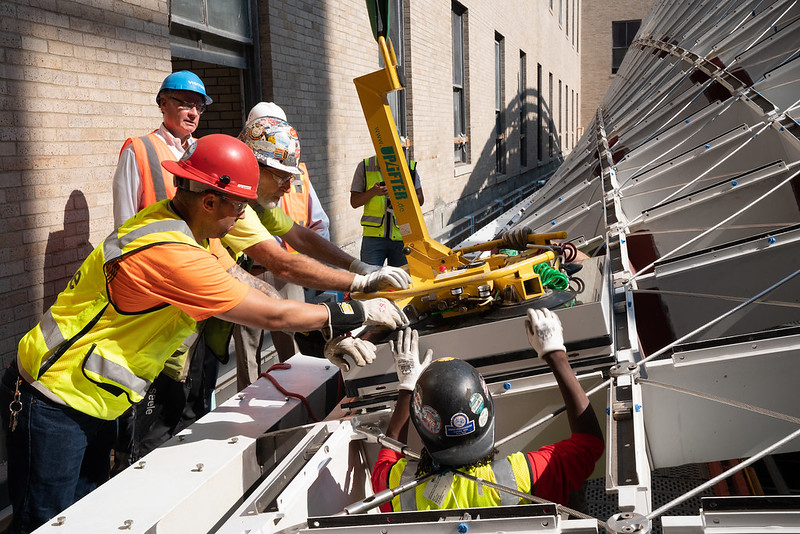
Construction workers, and many others, can benefit from prevailing wage expansion (photo: governor's office)
Massive unemployment following a period of slow recovery left 19 percent of Americans out of work. That was in 1938, when New York officially wrote the prevailing wage into the State Constitution, requiring projects that receive taxpayer funds to pay fair wages to their workers. Still deep into the Great Depression, New Yorkers understood that blue collar workers were the foundation of the economy and key to sustained economic growth.
Fast forward to today’s crisis and opponents of the prevailing wage are recycling old arguments against current prevailing wage legislation — arguments that did not work then and should not work now.
New York has an opportunity to provide a powerful economic stimulus at a critical time in our history by closing a loophole in its prevailing wage law so that private projects receiving significant public subsidies are covered. The underlying principle of the prevailing wage is straightforward: when public funds are used to subsidize and incentivize construction, public assistance should not be used to drive down wages or undercut benefits. It should instead uphold a community’s labor standards. This policy protects local economies and small businesses by maintaining higher consumer demand for goods and services.
Much has changed in the way projects are procured and financed since the prevailing wage was enacted by statute in 1894 and written into New York’s Constitution in 1938. Today public resources are leveraged creatively to attract private economic development. State policy needs to reflect this modern reality. However, New York is one of only 11 states that enable private developers to receive public assets without paying prevailing wages and benefits.
There are many reasons why expanding the prevailing wage is good public policy, especially during a weak economy. These standards provide a powerful economic stimulus for working families and local communities while generating much needed tax revenue for public programs. That’s how it helped spur New York’s economy during the tail end of the Great Depression.
The economic impact is significant. Total family income for construction workers is estimated to be at least 12.5% higher in prevailing wage states. Every dollar spent on prevailing wage jobs is estimated to generate $1.50 for local economies. Fair wages empower working families to buy cars, homes, appliances, and clothing. More discretionary income means larger turnout at restaurants and theaters and a greater ability to secure the necessary savings for education, health care, and retirement.
Stimulating New York’s economy, increasing state revenue, and wise management of public resources has never been more important than now. One very practical and fair way for lawmakers to do that is by expanding New York’s prevailing wage law, and they should do it now.
***
Fred B. Kotler is a policy analyst at the New York State School of Industrial and Labor Relations, Cornell University. He is the author of New York State Prevailing Wage Law: Defining Public Work, a report prepared for the New York State Senate in 2018.
***
Have an op-ed idea or submission for Gotham Gazette? Email This email address is being protected from spambots. You need JavaScript enabled to view it.
Looking Ahead to a New New York
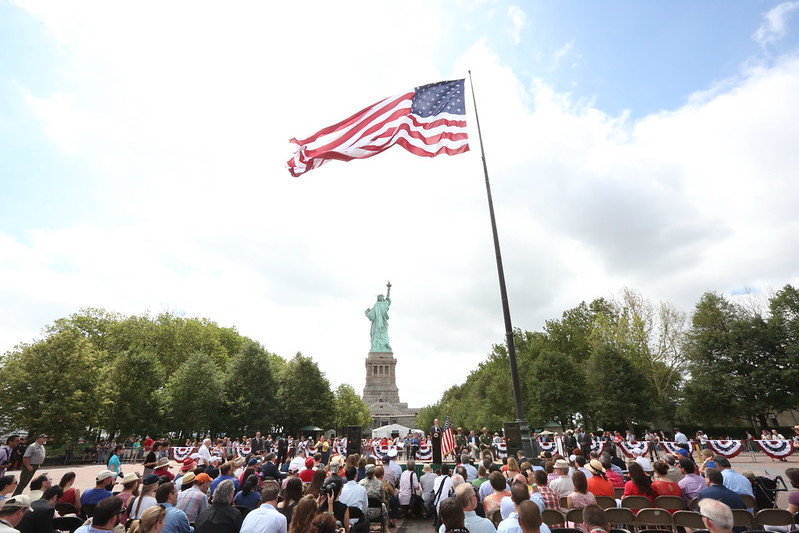
New York must take learn key leassons as it moves ahead (Photo: Spencer T Tucker/Mayor's Office)
Though it feels like an eternity, it was only about a year ago that Amazon walked away from plans to build a second headquarters in Long Island City. The online juggernaut was scared out of town by a short-sighted public debate that centered on legitimate concerns about gentrification and displacement but underplayed future-looking arguments about economic growth. At the time I argued, as a former city official during the dark days after September 11, 2001, that when a similarly tough tragedy darkened our doorsteps we would rue the day we turned Amazon and its tens of thousands of jobs away. Sooner than anyone could have anticipated, that day is here.
In the wake of this global coronavirus pandemic that has taken a particular toll on vibrant, dense cities like New York, I am skeptical that we will experience much gentrification or displacement in the months and years ahead due to a drop in demand. Our economy is retracting, unemployment is skyrocketing, and we have no clue when a recovery might even begin. As a veteran of 1987’s “Black Monday,” 9/11, and the economic collapse of 2008, I know that a downturn like the one we are entering has a disproportionate impact on low-income communities, particularly because of the contraction the city’s budget will face as our economy shrinks.
After 9/11 the city’s budget was approximately $43 billion; our current municipal budget is well over double that, primarily because of the extraordinary and diverse economic growth encouraged by the administration of Mayor Michael Bloomberg. Yes, that growth came with serious costs like those from gentrification and stop-and-frisk, but it also created the ability to massively invest in affordable housing, parks, school improvements like universal pre-kindergarten, and other public benefits that most American cities envy.
We are now about to witness the reverse of that process as our employment and tax base shrinks in the face of COVID-19. Every job we can hang onto will count. Working New Yorkers will sorely miss the employment—particularly the blue-collar jobs—that we lost when Amazon chose to build instead in only Virginia.
It’s true that Amazon subsequently leased some office space in Hudson Yards, but that represents a small fraction of the jobs that would have come, and more importantly, that space is for white collar professional jobs, unlike the originally proposed job mix for Western Queens. It’s also true that Amazon is a flawed company, with issues about labor standards, support of ICE, and lack of federal tax payments. But we can’t really apply pressure to address those issues in Virginia, and as we stare this current crisis in the face, arguments about tax discounts seem hopelessly naïve with the unemployment rolls skyrocketing by the day.
All that said, it is not fruitful to re-litigate the Amazon deal, particularly at this tragic time. But this period should serve as a reminder to those who fight all economic development that the problems our city faces are not static. New York City is now the national epicenter of this pandemic, and all New Yorkers must fight to restore global faith in our city and all that it represents.
As this virus eventually fades, we must remind people of what makes New York vital, of all that we missed confined in our homes – the buildings, subways, schools, streets, parks, museums, and theaters. We must revive our commerce and our culture, and we must do it together.
This will not be the physical reconstruction that 9/11 demanded. It will be a psychological reconstruction, a doubling down on density that will not be easy given what people are going through. We can begin by reminding ourselves of who we are, the city that was resilient in the face of pandemics past, the city that recreated itself in the aftermath of attacks and downturns, a city that has remade itself again and again.
As we reconstruct the idea of our city, we should turn down the heat and look to the light. Some—some—of our fellow citizens raised legitimate concerns with the Amazon deal, and they will continue to raise real concerns for our city’s neediest. As we move ahead, even as we disagree, let’s listen to each other with less polarization, let’s listen to science and experts, and let’s not just rebuild our old economy and old city, but a new city resilient to the shocks we know are coming, like an employment crisis, a housing shortage, and the biggest shock of them all, climate change.
Let’s look forward to a new New York, a better and fairer New York, a New York where we can listen and learn.
***
Vishaan Chakrabarti is an architect and author. On Twitter @VishaanNYCA.
***
Have an op-ed idea or submission for Gotham Gazette? Email This email address is being protected from spambots. You need JavaScript enabled to view it.
Elected Leaders Must Do Everything They Can to Limit Coronavirus Spread Among the Most Vulnerable — Including Shrinking Incarcerated Populations and No Bail Rollback
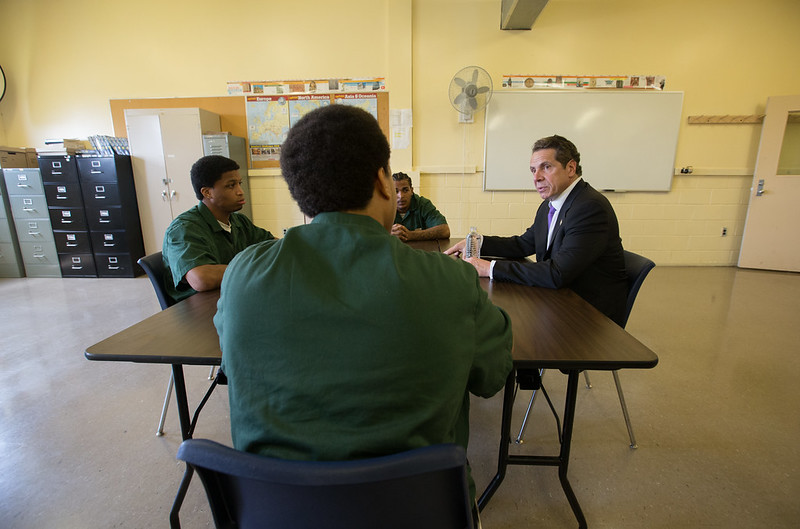
Gov. Cuomo visits a correctional facility (photo: governor's office)
Last week, the inevitable happened: the first cases of COVID-19 in Rikers Island jails and upstate prisons were confirmed.
We are on the precipice of a public health catastrophe in New York’s jails, prisons, and communities most impacted by mass criminalization and incarceration. COVID-19 can spread like wildfire through the state’s jails and prisons, where social distancing is all but impossible.
Much of this is preventable.
Right now, access to the basics, like soap and water, is limited and restricted. Testing and medical procedures vary across different jails and prisons, and many struggle to get even their most basic medical needs met. Jails and prisons by their design push people to an earlier death.
Yet incomprehensibly, in the throes of a crisis that threatens to overwhelm our public health systems, the Governor and state Legislature are still considering rolling back newly-enacted bail and other pre-trial reforms. All across the United States and the world, officials are urgently depopulating prisons. Meanwhile, New York’s politicians are rushing, behind closed doors, to put more New Yorkers behind bars.
This is traditional New York politics at its worst. It’s recklessly irresponsible and it will cost lives.
Jails and prisons might be located far out of sight, but they are not disconnected from New York’s communities. They are open 24-hours-a-day with staff coming and going and people constantly being released back into their communities. The health dangers in jails and prisons are not just confined within their walls—they put countless people throughout the state at risk of contracting the virus. Communities of color, especially black neighborhoods, are particularly vulnerable as a disproportionate number of incarcerated New Yorkers hail from these communities.
We’re already seeing a wave of incarcerated people released based on common-sense approaches and effective public health strategies. The New York City Board of Corrections has recommended releasing people who are over the age of 50, have underlying health conditions, have been detained for administrative reasons, and/or are serving sentences of less than a year. Brooklyn District Attorney Eric Gonzalez has vowed to temporarily stop prosecuting low-level offenses. The organization Releasing Aging People from Prison has called on Governor Cuomo to provide clemency to the elderly and people with compromised immune systems from state prisons.
That is why it’s mind-boggling that the Governor is still considering rollbacks to bail reform that would undoubtedly increase our jail population. The changes being discussed would give judges the power to remand people without the possibility of release pre-trial and would disproportionately impact people of color. While Cuomo and Senate Democrats are framing these rollbacks as progress, their proposal would not only bring us back toward the broken system bail reform was meant to address, but increase the risk of the virus spreading at the very moment we are taking drastic steps to protect other vulnerable populations.
Rather than focus on regressive rollbacks, Governor Cuomo should take additional measures to reduce our jail and prison population. He should grant clemency to criminalized survivors of gender and sexual violence, and release people from state prisons with less than a year left on their sentences. He should work with localities so the Departments of Correction can quickly approve the release of people from local jails under their jurisdiction. And he should of course take bail rollbacks off the table during state budget negotiations.
As the coronavirus threat emerged, Governor Cuomo boasted in a press conference that hand sanitizer is being produced by incarcerated New Yorkers -- hand sanitizer that has been considered contraband in our jails and prisons. Instead of exploiting their labor, it’s time New York State offered incarcerated people and the communities they come from the same care and protections being offered to all New Yorkers.
***
Mark Winston Griffith is Executive Director of Brooklyn Movement Center. On Twitter @GriffithMW & @BKMovement.
***
Have an op-ed idea or submission for Gotham Gazette? Email This email address is being protected from spambots. You need JavaScript enabled to view it.




